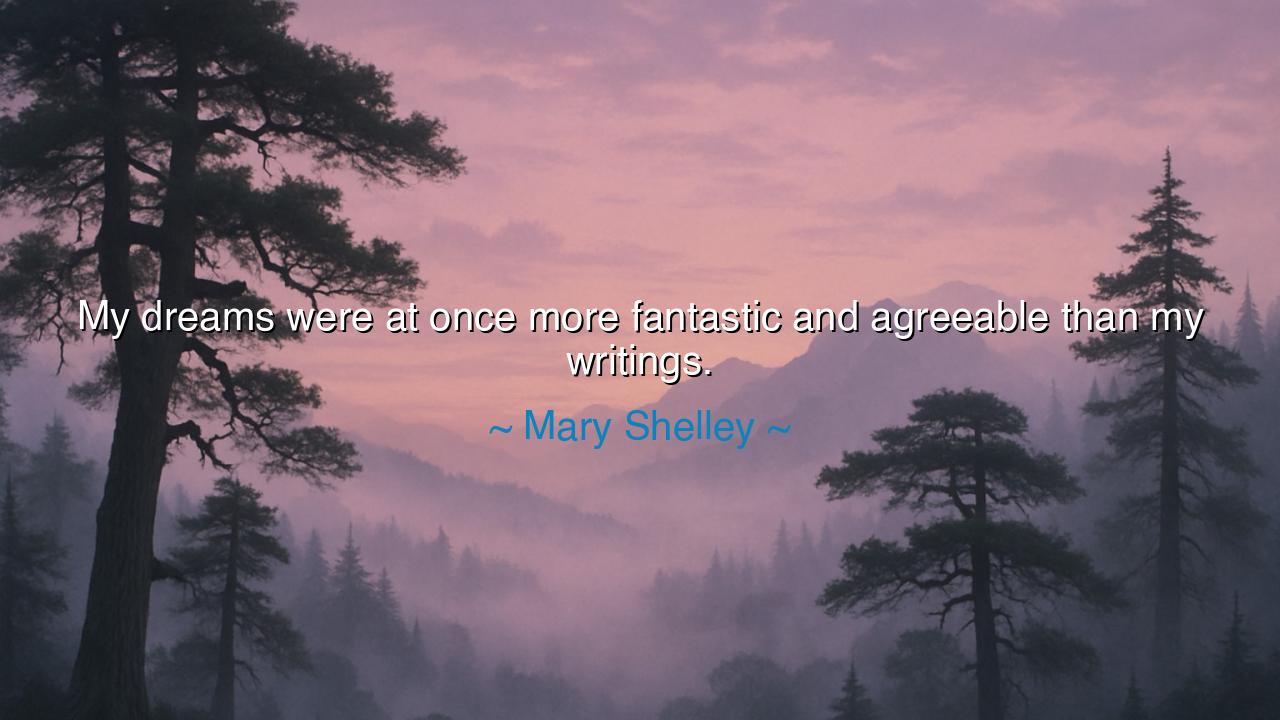
My dreams were at once more fantastic and agreeable than my






When Mary Shelley, the mother of Frankenstein, wrote, “My dreams were at once more fantastic and agreeable than my writings,” she was speaking from the heart of imagination itself. These words emerge from a soul that lived between waking and dreaming, between life and art, where visions were as tangible as reality. Her confession reveals the ancient truth that dreams are the birthplace of creation—the realm where beauty, terror, and revelation unite before they are bound into the limits of language. Shelley, who gave the world one of its greatest literary myths, understood that what she wrote was only the shadow of what she saw in her dreams.
In her youth, Mary Shelley walked among the poets and visionaries of the Romantic age—Percy Bysshe Shelley, Lord Byron, and others who believed that imagination was the divine spark within mankind. It was during the famous summer of 1816, while staying near Lake Geneva with these companions, that she dreamed of the vision that would become Frankenstein. In that dream, she saw “the pale student of unhallowed arts kneeling beside the thing he had put together.” This dream was not a mere fragment of sleep—it was revelation. Thus, when she later reflected that her dreams were more fantastic and agreeable than her writings, she was acknowledging that the dream realm, that sacred space beyond reason, holds truths deeper and more vibrant than ink can capture.
To the ancients, this belief in dreams as a bridge between worlds was no strange idea. The Greeks revered dreams as messages from the gods; the Egyptians built temples where seekers slept, hoping for visions of healing or prophecy. They understood, as Mary Shelley did, that imagination is a kind of divine language—a whisper of eternity to the mortal mind. When she calls her dreams “fantastic,” she does not mean fanciful or idle. She means that they contain a brilliance untouched by limitation, a beauty too vast for paper and pen. Her humility before her own imagination is the humility of every true creator: knowing that the soul dreams more deeply than the hand can write.
In this quote, there is also a poignant recognition of the human condition. For what we dream—our desires, our visions of love, our longing for transcendence—often exceeds what we can manifest in the waking world. The artist, the scientist, the dreamer—all struggle to turn the perfection of inner vision into the imperfection of reality. Shelley’s “agreeable dreams” remind us that within each of us lies a universe untouched by fear or failure, a place where all things are possible. But when we awaken, we must face the boundaries of time, mortality, and expression. Her words are thus both an exaltation and a lament: she rejoices in the grandeur of her inner world, even as she mourns that she cannot bring all of it into being.
Consider the life of Leonardo da Vinci, whose notebooks overflowed with sketches of flying machines centuries before flight was possible. His imagination soared beyond the reach of his era, and much of what he envisioned could not yet be realized. Like Shelley, his dreams were more fantastic than his creations, for his art and inventions were but echoes of what his mind had already seen. Yet without such dreamers—those who see farther than their age allows—humanity would never advance. The dream is the blueprint of the future; what is impossible in one lifetime becomes possible in another.
In truth, Shelley’s words teach us that dreaming is not an escape from reality—it is the first step toward creation. Her “fantastic” visions were not idle fantasies but the fountain from which her genius flowed. Every invention, every poem, every revolution begins in someone’s dream, in a vision too radiant to belong to the waking world alone. Dreams are the rehearsal of destiny; they allow us to touch perfection so that we might bring even a fragment of it into life. To dream, then, is to commune with eternity.
Let this, then, be the lesson: do not dismiss your dreams as idle play of the mind. Honor them. Record them. Chase them. For within them lies the raw material of your greatest works and deepest truths. If Mary Shelley could birth Frankenstein from a single dream, imagine what worlds lie waiting within your own sleep. Dreams remind us that we are not bound by what is, but invited to reach toward what could be. And though our waking creations may fall short of our inner visions, they remain sacred attempts to translate the infinite into the finite—to give form to the divine imagination that stirs within us all.






AAdministratorAdministrator
Welcome, honored guests. Please leave a comment, we will respond soon